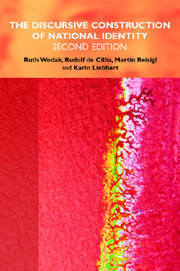Book contents
- Frontmatter
- Contents
- Preface to the Second, Extended Edition
- Acknowledgements
- 1 Introduction
- 2 The Discursive Construction of National Identity
- 3 On Austrian Identity: The Scholarly Literature
- 4 The Public Arena: Commemorative Speeches and Addresses
- 5 Semi-Public Discussions: The Focus Group Interviews
- 6 Semi-Private Opinions: The Qualitative Interviews
- 7 Conclusion: Imagined and Real Identities – the Multiple Faces of the homo nationalis
- 8 The ‘Story’ Continues: 1995–2008
- Appendix 1 Speeches Studied in Chapter 4
- Appendix 2 Speeches and Interviews Studied in Chapter 8
- Bibliography
- Index
2 - The Discursive Construction of National Identity
Published online by Cambridge University Press: 12 September 2012
- Frontmatter
- Contents
- Preface to the Second, Extended Edition
- Acknowledgements
- 1 Introduction
- 2 The Discursive Construction of National Identity
- 3 On Austrian Identity: The Scholarly Literature
- 4 The Public Arena: Commemorative Speeches and Addresses
- 5 Semi-Public Discussions: The Focus Group Interviews
- 6 Semi-Private Opinions: The Qualitative Interviews
- 7 Conclusion: Imagined and Real Identities – the Multiple Faces of the homo nationalis
- 8 The ‘Story’ Continues: 1995–2008
- Appendix 1 Speeches Studied in Chapter 4
- Appendix 2 Speeches and Interviews Studied in Chapter 8
- Bibliography
- Index
Summary
CRITICAL DISCOURSE ANALYSIS: DISCOURSE AS SOCIAL PRACTICE
Since the 1970s, the term ‘discourse’ has become common currency in an everyday research sense in a variety of humanities and social science disciplines, including the applied branches of linguistics. Because of the wide-ranging use of this term, a variety of meanings have been attributed to it (see Ehlich 1993, p. 145, and Ehlich 1994), which has led to considerable semantic fuzziness and terminological flexibility. In the following we will briefly describe the concept of discourse as it is currently employed in the context of the research activities carried out at the University of Vienna, which have also informed the present investigation, and place this usage within the international research context (for an overview of research on discourse analysis in Austria, see Menz 1994).
The paradigm of Critical Discourse Analysis is not homogeneous. The British variety, represented by such figures as Gunther Kress, Robert Hodge, Roger Fowler, Norman Fairclough and Theo Van Leeuwen, has drawn upon Foucault's theory of discourse and, in its linguistic dimension, is closely associated with the systemic linguistic theory formulated by William Firth and M. A. K. Halliday, as well as with Halliday's social semiotics. The cognitive-oriented approach of Dutch Critical Discourse Analysis, exemplified by the work of Teun van Dijk, uses a triadic model to show how personal and social cognition mediates between social structures and discourse structures. German Critical Discourse Analysis, as practised by Utz Maas, Siegfried Jäger and Jürgen Link, has been influenced even more strongly by Foucault's concept of discourse than has the British.
- Type
- Chapter
- Information
- The Discursive Construction of National Identity , pp. 7 - 48Publisher: Edinburgh University PressPrint publication year: 2009



